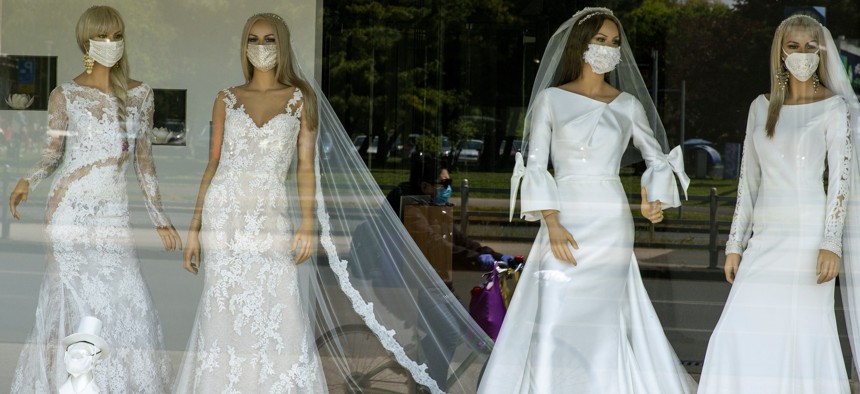Ohio Bans Dancing at Weddings to Curb Covid-19 Spread

A cyclist wearing a protective mask to protect against coronavirus is reflected in the window of a wedding dress store with mannequins wearing face masks on Thursday, April 23, 2020. AP Photo/Darko Bandic
The state is implementing new restrictions on weddings and other events as cases swell and as more coronavirus infections are being linked to social and family gatherings.
Weddings held in Ohio will face strict new rules under a new coronavirus order issued by the governor that bans typical celebratory activities like dancing and buffet-style meals.
The order, issued Monday, quickly drew comparisons on social media to the movie Footloose. But Gov. Mike DeWine defended the move, saying community spread of Covid-19 is happening through private social events like weddings.
“We have seen rampant spread of the virus as a result of banquets, wedding receptions, and social gatherings following funerals,” DeWine said as he announced the new order. “We have seen great tragedy associated with such events. It’s not the ceremonies causing the problem. It’s the party afterward.”
Weddings and funeral repasts will still be allowed to go forward under the order, but banquet facilities hosting such events will have to adhere to certain social distancing protocols. Specifically, no dancing or socializing in open congregate areas will be allowed, guests will be required to remain seated at all times, food must be served to guests at their tables and buffet-style arrangements will be banned. Masks must be worn at all times except for when eating, no more than 10 people can be seated at a table and those guests must be from the same household.
The order will not prevent traditional wedding reception events such as the first dance, toasts, cutting of the cake or tossing of the bouquet.
The latest order comes as Ohio, like many other states, has seen a dramatic surge in coronavirus cases. The state has recorded upwards of 290,000 confirmed or probable coronavirus cases since the pandemic began and more than 5,700 related deaths, according to the Ohio Department of Health. On Friday, Ohio recorded 8,071 new cases, a record number of cases in a 24-hour period.
While the initial swell of coronavirus cases to hit the United States was associated with cluster infections that spread rapidly in nursing homes, states are increasingly linking Americans’ small, private gatherings to local outbreaks.
Recent state reports issued by the White House Coronavirus Task Force identify gatherings among extended family and friends as a significant concern when it comes to community spread of the virus.
“Unrelenting and significant community spread is initiated by social gatherings among friends and family,” read a report issued for Ohio at the beginning of November. “People must
remember that seemingly uninfected family members and friends may be infected but asymptomatic. Exposure to asymptomatic cases can easily lead to spread as people unmask in private gatherings.”
Reports for Colorado, Kansas and Illinois include similar warnings. The Colorado report, from Nov. 1, indicates that community spread from asymptomatic individuals is occurring at social and family gatherings when people do not observe social distancing and mask wearing protocol because they are “assuming ‘healthy’ family members and friends are not infected with COVID since they do not have symptoms.”
“Highly infectious asymptomatic Covid individuals then cause ongoing transmission, frequently infecting multiple people in a single gathering,” said the report, which recommends more public messaging efforts to warn people they should continue wearing masks and social distancing.
The reports were obtained by the Center for Public Integrity.
State and local health officials are urging people not to host traditional Thanksgiving dinners with lots of guests and instead to limit gatherings to family members they already live with.
DeWine doubled down on the call for people to reduce their social interactions so that the state is not required to take more drastic measures.
“We're not talking about shutting down, we're talking about slowing down,” DeWine wrote on Twitter. “We're seeing tremendous spread because people are letting their guard down around friends/family. With this amount of community spread in Ohio, your odds of getting this virus are much higher now.”
Andrea Noble is a staff correspondent with Route Fifty.
NEXT STORY: In One State, a $100 Million Push to Keep the Heating on This Winter





